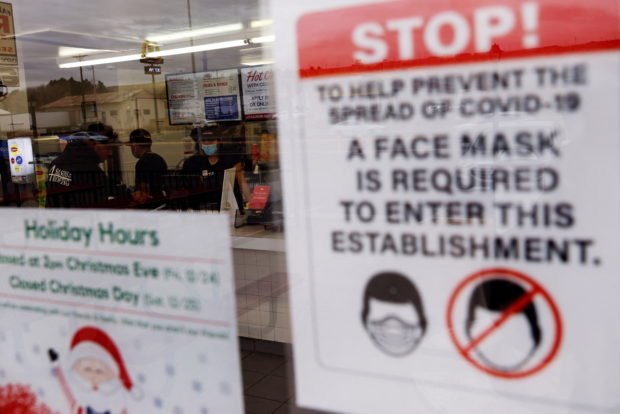A year after first U.S. shots, pandemic hallmarks re-emerge

Employees wear protective face masks, amid the coronavirus disease (COVID-19) pandemic, as they serve a patron at a fast food restaurant in Farmington, New Mexico, U.S., December 9, 2021. (REUTERS)
TAOS, N.M. – Nearly a year after COVID-19 vaccines were first administered in the United States, the country is returning to many of the hallmarks that defined earlier pandemic life: mask mandates, mass vaccination sites, crowded hospitals and a rising death toll.
Amid hope that humanity would soon get the upper hand on the coronavirus, New York City intensive care unit (ICU) nurse Sandra Lindsay received a dose of Pfizer’s just-approved vaccine last Dec. 14, becoming the first inoculated U.S. resident.
Since then, more than 200 million others – more than 60% of the U.S. population – have gotten at least two doses of the Pfizer/BioNTech or Moderna vaccines or one Johnson & Johnson’s single-shot inoculation, according to the Centers for Disease Control and Prevention.
Despite that triumph of modern science, the country’s death toll continues to mount. Since the first dose was administered, nearly 500,000 more people have died of COVID-19, with the country expected to cross the 800,000 mark next week, according to a Reuters tally.
Both infections – approaching 50 million since the start of the pandemic – and deaths have been rising in recent weeks, especially as colder weather in northern states pushes activities indoors, allowing for easier virus transmission.
Article continues after this advertisementResurging infections on Friday prompted New York Governor Kathy Hochul, a Democrat, to temporarily re-impose a requirement for face coverings inside businesses and venues that do not require proof of vaccination.
Article continues after this advertisement“We shouldn’t have reached the point where we are confronted with a winter surge, especially with the vaccine at our disposal, and I share many New Yorkers’ frustration that we are not past this pandemic yet,” Hochul said in a statement.
Mask mandates, which Republican governors mostly eschewed as government overreach, were a common infection-prevention tool for many Democratic governors during the pandemic’s worst surge that began during the year-end holiday season of 2020.
Combating the virus has been complicated by its more aggressive mutations, including the currently dominant Delta variant and fast-spreading Omicron, which was first identified last month and has already been detected in nearly half of the 50 states.
The politicization of vaccines and hesitancy of many Americans to get the shots has also helped keep the pandemic going, usually with more deadly results, experts said.
Health officials in Connecticut this week said unvaccinated people are five times more likely to get infected with COVID-19, 12 times more likely to be hospitalized and 16 times more likely to die.
‘FUEL FOR THIS FIRE’
In New Mexico, hospitals are reaching record capacity levels as unvaccinated patients fill ICUs. The state’s Democratic governor, Michelle Lujan Grisham, pushed vaccinations early in 2021 to try to limit hospitalizations.
As with other states with early high vaccination rates like Vermont, Rhode Island and New Hampshire, immunity has waned in New Mexico, pushing these states toward the top of rankings for new cases.
Over 150 people on Tuesday waited for a hospital bed in two Albuquerque emergency rooms, some relatives lashing out at staff in frustration, according to health officials.
“The fuel for this fire, our case counts, is unvaccinated individuals,” New Mexico Acting Health Secretary David Scrase told reporters. “Our hospitals are in a really grave situation.”
Three out of four COVID patients in the state are unvaccinated, officials said. The same was true for Michigan, dealing with one of the nation’s worst outbreaks.
Shortly after the Omicron variant was detected in New Jersey, Governor Phil Murphy this week reopened one of the state’s previously shuttered mass vaccination sites in an effort to encourage residents to get booster shots.
Most of the large vaccination sites that states opened early this year to speed inoculations have closed.
The CDC estimates that about one-fourth of Americans have gotten additional booster shots so far. They have now been authorized for everyone age 16 and up.
Another symbol of the early pandemic, the contaminated cruise ship, also re-emerged this week.
On Monday, Norwegian Cruise Line Holdings said a South African crew member suspected of having the Omicron variant was among 17 cases of the virus detected on a ship that disembarked in New Orleans over the weekend.
In March 2020 when relatively few cases had been reported in the United States, the cruise ship Grand Princess was held at sea for days before being allowed dock in Oakland, California. Its 2,400 passengers were sent into quarantine at military bases after tests revealed 21 positive cases of the coronavirus.
gsg
For more news about the novel coronavirus click here.
What you need to know about Coronavirus.
For more information on COVID-19, call the DOH Hotline: (02) 86517800 local 1149/1150.
The Inquirer Foundation supports our healthcare frontliners and is still accepting cash donations to be deposited at Banco de Oro (BDO) current account #007960018860 or donate through PayMaya using this link.